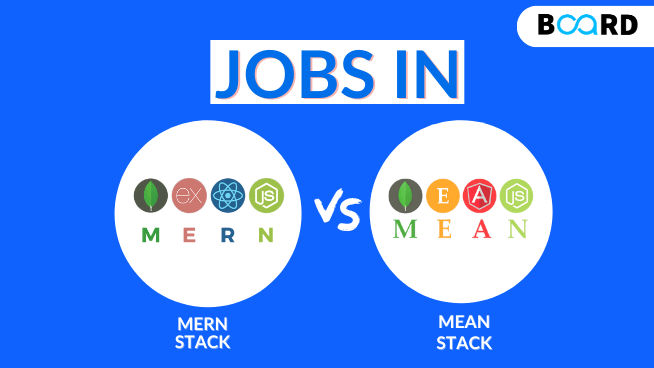Essentials of Back-End Development: From APIs to Databases
Client Side and Server Side Scripting: Explanation
Jobs in MERN Vs MEAN Stack

If you are an aspiring full-stack developer, then the decision of the right tech stack will be deciding your future. Full-stack development is no doubt one of the most sought-after careers and one can develop solutions that directly target the betterment of society.
The MERN vs. MEAN is the most trending debatable topic of the decade. Both being the top competitors of the industry attract many new developers, however, the confusion regarding which one to choose in terms of better job opportunities still holds them up.
MERN Stack: Components and Advantages
MERN stack is a JavaScript framework that comprises MongoDB (M), Express (E), React (R), and Node (N) as its primary technologies. It is in tough competition with the MEAN stack due to the high demand and popularity of both Angular and React.
- MongoDB - document database
- Express(.js) - Node.js web framework
- React(.js) - a client-side JavaScript framework
- Node(.js) - the premier JavaScript web server
Advantages of MERN Stack
- Web applications that are JSON wavy and dynamic are preferably created using the MERN stack.
- With React.js gaining popularity, there is a subtle increase in the demand for MERN stack developers.
- Since MongoDB is solely created to store JSON data initially, it tremendously boosts the productivity of other stacks of MERN.
Demand for MERN Stack
React.js is one of the 4 components of the MERN stack, which is the reason for the high demand for MERN developers in the market. Since React.js is maintained by the tech giant Facebook, this flexible framework is used by many top companies including Netflix, PayPal, Uber, Instagram, Pinterest, and the list goes on, here are a few more points to focus on:
- MERN stack is becoming the first choice of emerging startups.
- React-native plays a crucial role in the increasing demand for the MERN stack.
- Developers get a smoother experience of converting any web app into a mobile application using MERN.
- Companies are shifting their existing applications to MERN-based applications.
MEAN Stack: Components and Advantages
MEAN stack is a popular framework based on JavaScript and is used to develop web applications. MEAN and MERN differs in the client-side JS framework. While MERN uses React, MEAN uses Angular.js. The following are the components of the MEAN stack.
- MongoDB - document database
- Express(.js) - Node.js web framework
- Angular(.js) - a client-side JavaScript framework
- Node(.js) - the premier JavaScript web server
Advantages of MEAN Stack
- MEAN stack is used to create advanced web applications like workflow management tools and interactive forums.
- All the components are intuitively integrated since they are based on JS and JSON.
- E and A of MEAN i.e., Express and Angular are arguably the most popular back-end and front-end JavaScript frameworks respectively.
- Since all the components of MEAN are open source, this acts as a boon to developers.
Demand for MEAN Stack
Angular is the differentiating factor of the MEAN and the MERN stack. It provides high readability and productivity which makes it easy to grasp for new developers. Many companies use MEAN as their primary stack due to its high functionality and component-based architecture. Have a look at the below points to have an insight into the rising demand for MEAN Stack:
- Being open-source, this tech stack is used by many big companies including Microsoft, Fiver, Upwork, Accenture, Deutsche Bank, among others.
- It’s highly robust and allows the development of faster applications.
- MEAN stack is a cost-effective solution and that’s why a MEAN stack developer is a complete package for any company.
- MEAN stack developers are paid a good in-hand salary which is one of the reasons for its popularity among young developers.
Points to consider before opting for MERN or MEAN Stack
Before you opt for any of these technology stacks, you should consider some major aspects which can become the deciding factor for your decision. The following points will guide you to go for the right choice.
- Analyze the requirements of the projects you’ll be working on.
- Consider the development costs included in both the MEAN stack and the MERN stack.
- MERN stack is considered to be easier to learn comparatively.
- Analyze the scalability and flexibility that can be achieved using both of the stacks.
Final Verdict: Which one to go for?
- Both MERN and MEAN stacks are doing great and are ahead of their competitors by miles.
- Due to the versatility of React.js, it is getting popular over Angular.js, and due to this MERN stack is overpowering the MEAN stack.
- Many developers are switching from Angular.js to React.js just because of the rise of the MERN stack.
- So the winner of this race is definitely the MERN stack.
